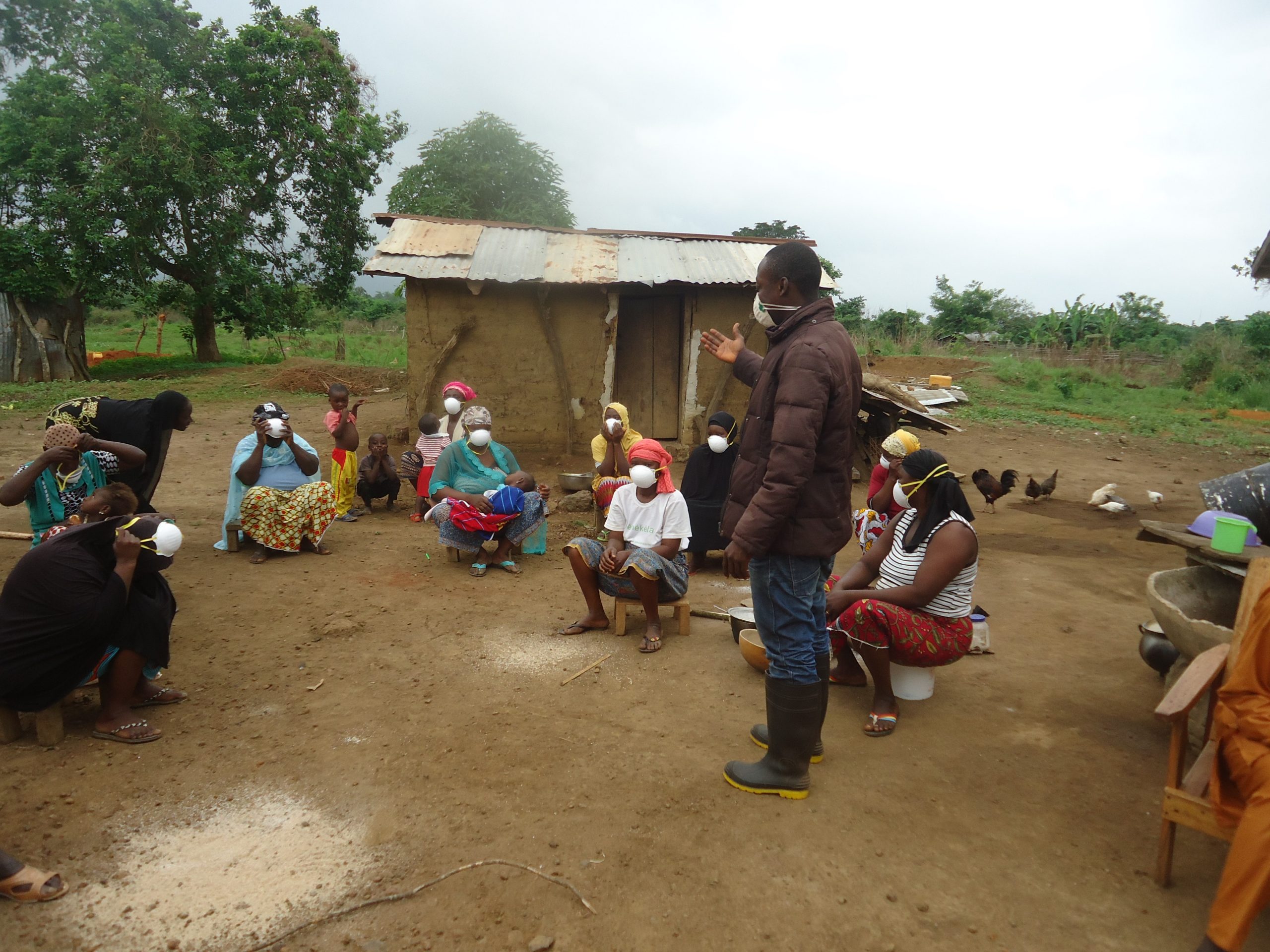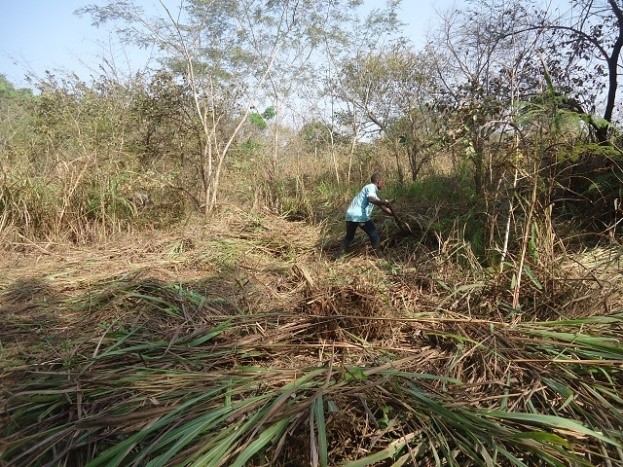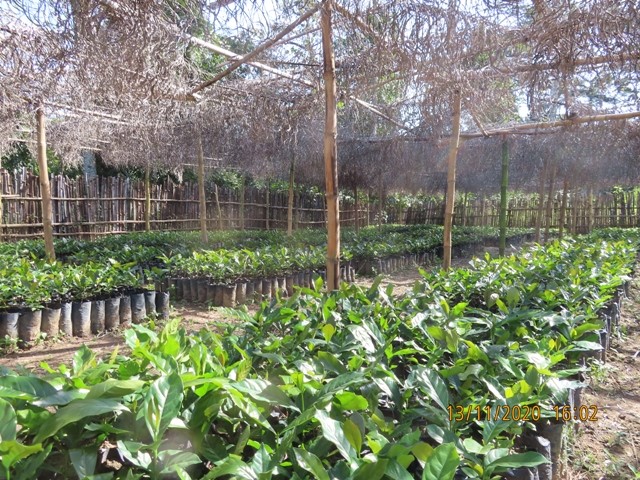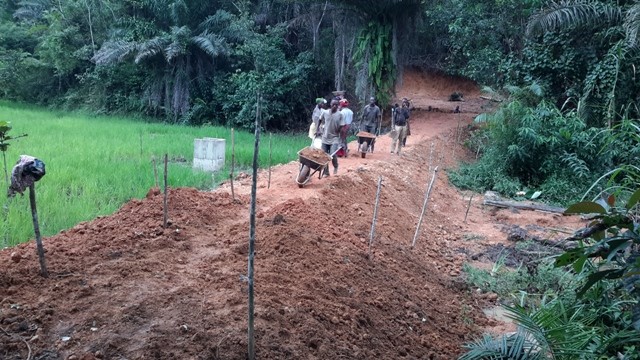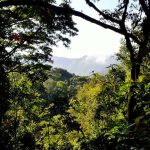Conservation of wooded hills, habitat of chimpanzees in Bossou, Guinea, West Africa
Located in the Lola Prefecture, the forest hills of Bossou (320 ha) are part of the Nimba Mountains Nature Reserve, listed as a UNESCO World Heritage Site. The vegetation covers at the foot of these hills is connected to small adjacent forests that are home to a community of chimpanzees, a critically endangered species. Bossou and the surrounding villages are a rare example of a site where chimpanzees and the local population have coexisted relatively in good harmony for several generations, sharing the resources of the same forest.
Despite long-term protection efforts, Bossou’s chimpanzees are currently isolated from the chimpanzee populations of the neighboring Nimba Mountains, which creates a serious problem of viability for this community. The patches of natural forest that these hills still bear have been damaged, however the habitat has been under intense pressure and poses a serious threat to the survival of chimpanzees.
In view of this situation, the NGO AUDER in partnership with the PPI is providing support to the Bossou Environmental Research Institute (IREB) in its program to restore the green corridor.
The project aims to: (i) Increase the knowledge of communities on threats to the habitat of chimpanzees to promote their participation in conservation efforts; (ii) Prevent and ensure the management of bush fires around the corridor and in neighboring communities; (iii) Improve the efficiency of the reforestation effort underway in the corridor, carry out agro-forestry plantations and (iv) Promote best agricultural practices through the development of income-generating activities (IGA).
To date, PPI support has made it possible to carry out the following activities:
Increase the knowledge of communities on the threats to the habitat of chimpanzees and promote their participation in conservation efforts
To increase the knowledge of communities on the threats of extinction facing chimpanzees in Bossou, AUDER supervisors sensitized 1,337 people in neighboring communities through meetings, village assemblies and radio broadcasts. These messages prompted a strong mobilization of the communities in the management of fires and their engagement in the realization of agro-forestry plantations in the savannah zones as a measure to fight against savannah and bush fires.
Also through spaces for dialogue and exchange, AUDER brings together local elected officials, opinion leaders, technical services and actors working in the area on specific conservation issues. To this end, three community forums were organized bringing together a total of 101 people and made it possible to define strategies for the prevention and management of bush fires in the Nimba Mountains, and to draw up a memorandum of understanding for the protection of wooded hills. This agreement has been signed by all stakeholders (AUDER, IREB, CEGENS, DPEEF and communities).
Prevent and ensure the management of bush fires around wooded hills and the corridor and in neighboring communities
Bushfires are the main threat to the habitat of chimpanzees and a limiting factor for the completion of the corridor restoration program.
To do this, a fire brigade of 40 members was set up and made operational through two training sessions organized on measures for the prevention and management of bush fires and the technical itineraries for setting up an agro plantation forest. Also work equipment and materials were provided to the members of the brigade (wheelbarrows, machetes, helmets, file, watering cans, dabas, pairs of boots, raincoats and pairs of gloves).
The brigade has been structured, it has the legal documents (statute and internal regulations and approval); it is supported in the field by 2 supervisors and 6 guides from the IREB for the prevention and management of fires.
The project supports the IREB in the construction of firewalls (20m wide and 600m long protective strip) which limits the corridor and in clearing and cleaning thanks to the mobilization of the three neighboring villages (Bossou, Nyon and Serengbara).
Improve the efficiency of the current reforestation effort and promote agroforestry to reduce pressure on the hillside
This action aims to produce quality forest and agro-forestry plants for the reforestation of degraded areas and also to provide neighboring villages with high-performance plant material for the establishment of agro-forestry plantations around the wooded hills of Bossou and the corridor.
A nursery of 23,000 agro-forestry plants (coffee, cocoa, palm, cashews) and a few forest plants has been installed in Theassou for the 2021 reforestation campaign thanks to the financial support of PPI partners.
The creation of agro-forestry plantations should make it possible in the long term to significantly reduce the risk of fires in the wooded hills, protect the reforestation activities already carried out and prevent the gradual advance of the savannah in the area. For AUDER, it is a question of reducing cropping systems on the hillside while integrating them into sustainable production systems and ensuring the social and economic promotion of the actors concerned
Project support made it possible to reforest 11.5 ha in the corridor and 21.9 ha of agro-forestry plantations built around the corridor. This activity is part of a local dynamic of conservation and improvement of the living conditions of the populations bordering the corridor.
Promote best agricultural practices to reduce pressure around the hills and the corridor
AUDER provides support for the reconversion and specialization of some farmers through the promotion of local income-generating initiatives in order to reduce pressure on the hillside. The intensification of vegetable cultivation is helping to meet the need for increasingly scarce vegetables and improve women’s incomes. In the same context, the NGO is developing fish-farming rice facilities to allow rice and fish to be grown in the same location in order to reduce cultural nomadism.
134 members of market gardening groups, Village Savings and Credit Associations (VSLAs) and rice-fish farming have been trained in composting techniques for market gardening, development and development of rice-based farms. Today, 13 are already practicing the lessons received in composting, making boards, setting up a market garden nursery and fertilizing ponds on their sites.
The project provided them with tools and agricultural inputs (wheelbarrows, machetes, pickaxes, plastic bags for coffee, cocoa and palm trees, cords, rakes, shovels, dabas, hoes, watering cans, tying wires, pliers, axes, decameters, etc. ) to make them more operational in the field.


